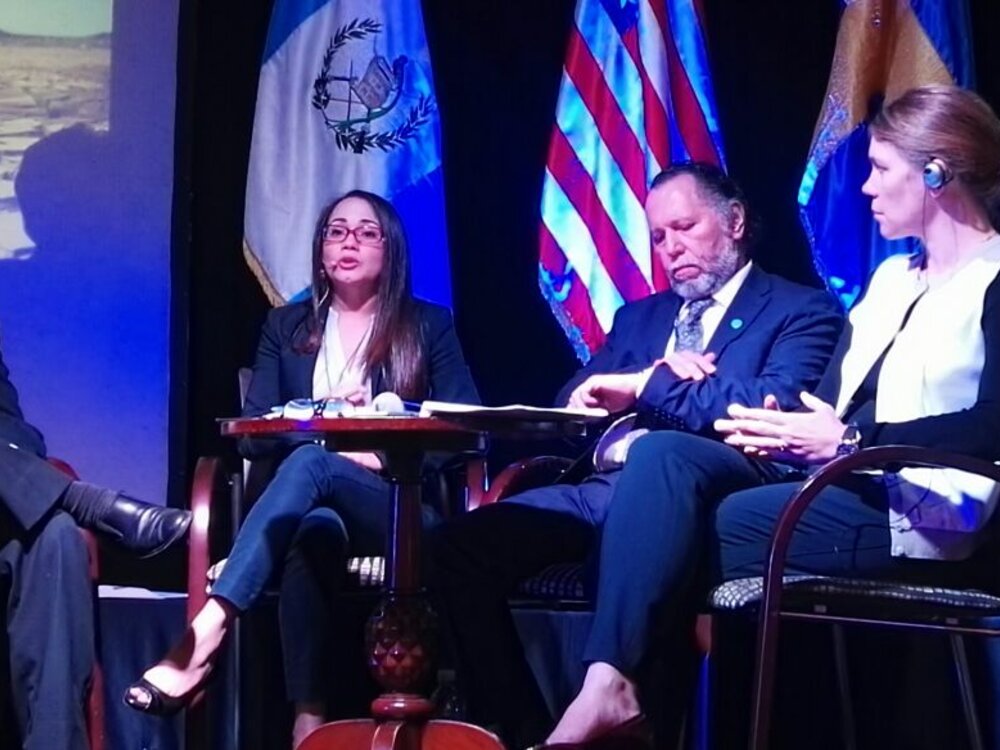CABEI promotes sustainable development to face the challenges of regional climate change

During the strategic period from 2010-2014, CABEI approved US$7.62 billion in development-related interventions to its member countries, 67% of these interventions incorporate climate change mitigation and adaptation measures.
Tegucigalpa September 29, 2016. – The Central American Bank for Economic Integration (CABEI), pursuant to its institutional mandate and as part of its commitment to promoting and supporting financing for climate change mitigation and adaptation measures, is making important progress in supporting the region’s efforts.
During the “Central America Donors Forum,” CABEI specialist Anisorc Brito discussed different methods to strengthen funding in order to combat the effects of climate change in the region.
CABEI initiatives support the region to face the challenge of climate change
In her presentation, Ms. Brito declared that the 2015-2019 CABEI Institutional Strategy has three strategic axes: Social Development, Competitiveness and Regional Integration, as well as the cross-cutting axis of Environmental Sustainability. In addition, the Institutional Strategy defines six focus areas to support that Bank’s member countries: Productive Infrastructure, Energy, Rural Development and the Environment, Human Development and Social Infrastructure, Financial Intermediation and Development Finance and Competiveness Services.
In her analysis, she noted that the cross-cutting axis of environmental sustainability is part of CABEI’s Environmental and Social Policy, which includes three components: 1) The Institutional Responsibility Plan (PRI) for internal aspects; 2) The Environmental and Social Risk Identification, Evaluation and Mitigation System (SIEMAS), through which risk is evaluated at the level of the interventions that the Bank finances based on international standards; 3) Environmental and Social Strategy, which deals with the issue from strategic and global perspectives.
Ms. Brito further stated that CABEI has channeled significant resources to projects that contribute to climate change adaptation and mitigation. During the strategic period from 2010-2014, CABEI approved US$7.62 million in development-related interventions to its member countries, 67% of which incorporate climate change mitigation and adaptation measures.
The majority of the projects that support climate change adaptation belong to the sectors of road infrastructure, health, water and sanitation and agriculture, said Ms. Brito.
With regard to the contribution of projects approved during the mitigation analysis period, the energy sector stood out with the financing of hydroelectric, wind, biomass, photovoltaic and geothermal projects. Renewable energy projects had a direct effect on the reduction of 3.1 million tons of CO2 emissions annually from the operation of projects approved from 2010-2014, avoiding the emission of greenhouse gases by reducing dependence on non-renewable energy sources as well as supporting the diversification of the energy matrix of the region’s countries.
CABEI was accredited by the Adaptation Fund at its Board meeting on October 8 and 9, 2015 in Bonn, Germany. This accreditation will allow the Bank to finance concrete adaptation activities to reduce vulnerability and increase the response capacity to climate change impacts in the region. In addition, accreditation with the Adaptation Fund will establish the elements necessary to progress in the formalization of CABEI’s accreditation process with the Green Climate Fund.














